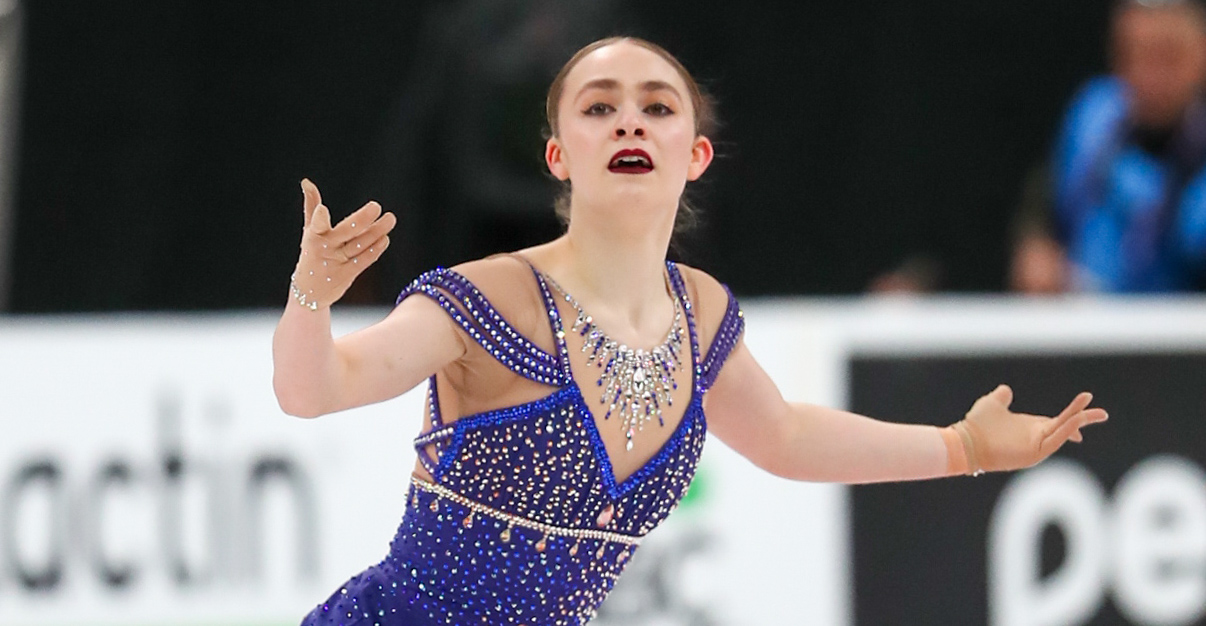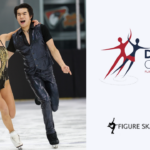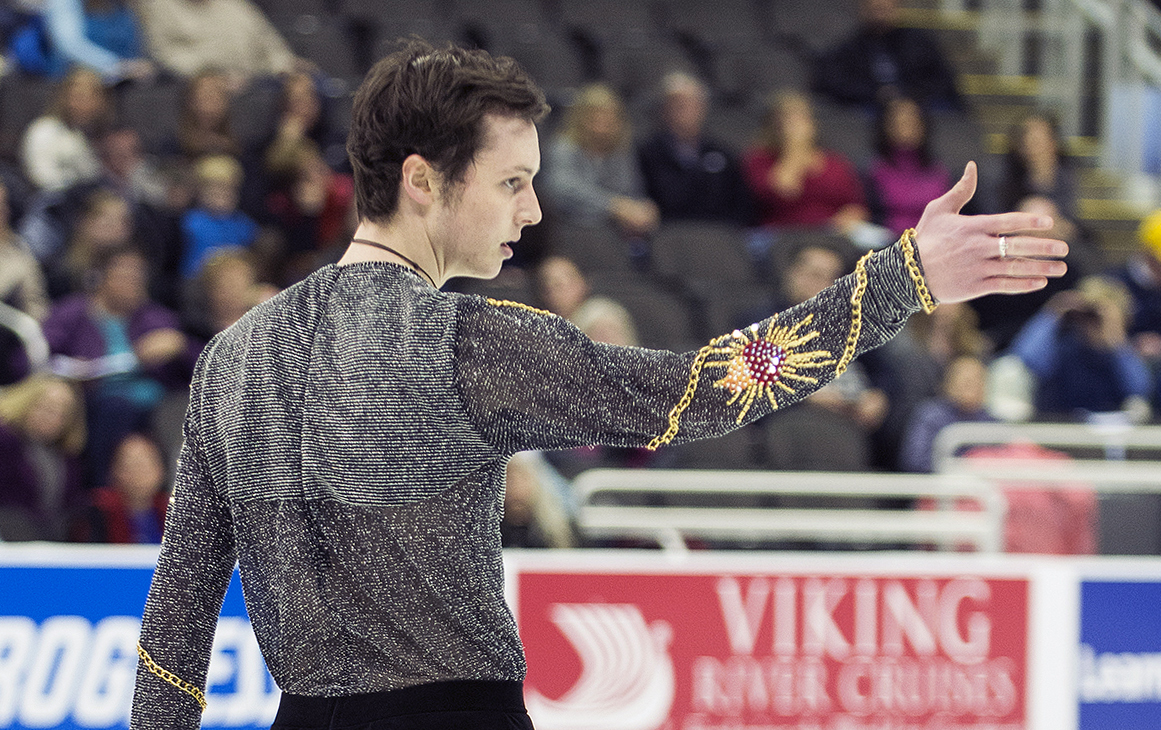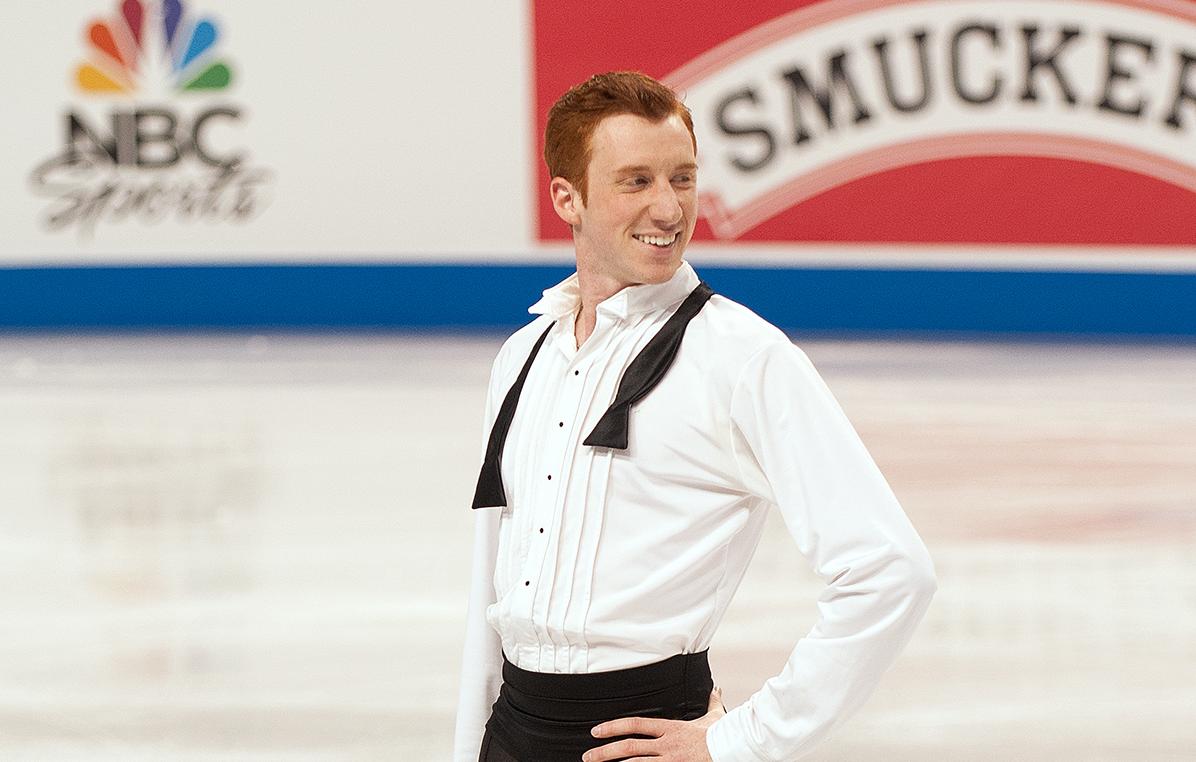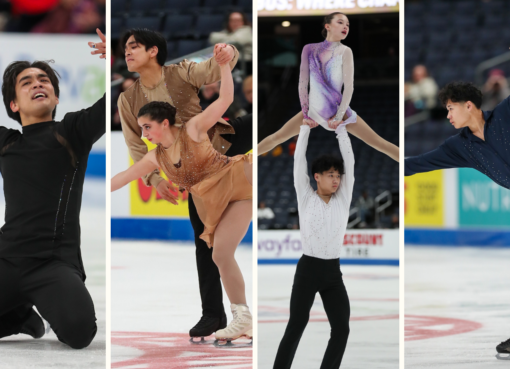By Sophia Sandoval, Team FSO contributing writer
Photos by Robin Ritoss
Editor’s Note: This is the third in a series of articles on skaters who are competing in U.S. Figure Skating’s Collegiate/Intercollegiate Skating.
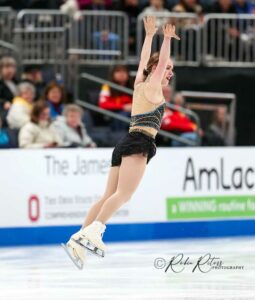 Wren Warne-Jacobsen almost never has any downtime. When not in the classroom studying journalism at the University of Minnesota, the rising junior is training at an ice rink 30 minutes away from campus.
Wren Warne-Jacobsen almost never has any downtime. When not in the classroom studying journalism at the University of Minnesota, the rising junior is training at an ice rink 30 minutes away from campus.
The life of a student athlete is fast-paced and hectic. It is imperative that she keeps a balance in order to perform both inside and outside of the classroom.
For an athlete like Warne-Jacobsen, it can be isolating. The average student can’t relate to the experience of waking up at the crack of dawn to train before classes. They can’t relate to having to miss a study session to run programs.
That is why Warne-Jacobsen loves the U.S. Collegiate Championships. It’s something like a homecoming for her. A week where she can compete and be amongst people who share these unique experiences.
“It’s a kind of a shared appreciation that we all have,” Warne-Jacobsen said. “You can feel the environment, that everyone’s there because they love to skate, and they want it to be part of their lives.”
The championships, hosted in her home state of Minnesota, will take place from July 19 through 20. Warne-Jacobsen will come into the competition not just as the home state hero, but as the defending champion. It’s a homecoming in a spiritual and literal sense.
The Bemidji native would be lying if she told you that she didn’t feel pressure to go back-to-back. Instead of worrying about winning, Warne-Jacobsen is focused on putting out two good performances. If she accomplishes that, the rest will come next.
“To be a rising junior and still improving in skating and pushing my boundaries is really fulfilling, so I’m just excited to go enjoy it and do my best,” she said.
Even though this weekend’s competition is a championship, it is the start of a long season for Warne-Jacobsen, who’s ultimate goal is to make it back to the U.S Figure Skating Championships, where she most recently placed 13th.
During the midst of summer, Warne-Jacobsen doesn’t have to worry as much about balancing school work and training, but that isn’t the reality between the months of August and May.
Up until her freshman year at Minnesota, Warne-Jacobsen’s education was entirely online in order to allow more time for training. So, two Augusts ago she had no choice but to adjust her life to a rigorous training and academic schedule.
It’s a sink or swim lifestyle.
There were a few bumps along the road, some all-nighters pulled, but Warne-Jacobsen quickly learned the art of prioritization. During the fall she tries to make her class schedule as open as possible, because that is when the majority of her big competitions are. However this past spring semester was her hardest academically, so Warne-Jacobsen had to accept the fact that skating needed to take a backseat for some time in order for her to focus on school. Now that it’s the summer, she is trying to make as much progress as she can.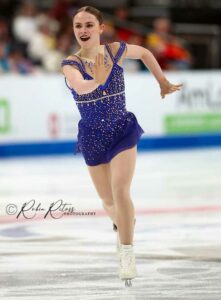
“It’s been a difficult but fulfilling journey of figuring out where I want to put my priorities,” Warne-Jacobsen said. “And I think I’ve (learned) a lot of life skills on how to find balance between two very engaging, but at times very demanding commitments.”
In a time where skeptics assert that the sport is dying, small-town clubs, like Go4Gold Skating Academy, are thriving more than ever.
Go4Gold, located in the growing city of Shakopee, is like a second home for Warne-Jacobsen. Being a long-time member and an experienced veteran, she has stepped into the role of a mentor for the next generation.
Being an athlete that is looked up to by young girls is something that she doesn’t take lightly, and it serves as an extra push for her to be not just a better athlete, but a better person.
“It’s really an extra level of fulfillment to see that I get to inspire a new generation,” Warne-Jacobsen said. “I hope to be able to offer some guidance to make the journey a little easier.”
Taking on more of a leadership role is a full circle moment for Warne-Jacobsen, who said having role models early in her career was an important part of her journey. Warne-Jacobsen credits one of her coaches and choreographers, Kate Charbonneu Shurts, as a massive influence. After Warne-Jacobsen moved to the Twin Cities area to pursue skating full-time at the age of 10, Charbonneu Shurts, who was the Canadian junior champion back in the day, was approaching the end of her competitive career.
Cut to around 10 years later, Warne-Jacobsen is now both the mentor, helping guide the young women at the club, and also the mentee, training under Carbonneu Shurts.
“I definitely really admire her continued involvement and passion for the sport, as a collegiate athlete and someone who really hopes to continue my participation in the sport past school and into my professional life.”
No matter what happens at the collegiate championships, Warne-Jacobsen must switch her focus to the national qualifying series this fall. In order to make it back to the national championships, she must qualify for and place in the top two of the Midwestern Sectional Finals, a competition she won last season.
This means that she is competing and training for a large majority of the year. Recurring burnout is almost inevitable for Warne-Jacobsen and it is a continuous experiment for her in trying to recognize the signs and manage both the mental and physical manifestations of fatigue.
Whether that be just running choreography and not jumping for a session, or putting off homework for the day, it’s important to Warne-Jacobsen that she learns to take breaks when needed and be patient with herself.
“I don’t think anyone should feel alone in feeling overwhelmed or burnt out in college, especially as a student athlete, so I think we can all try to lean on each other and just be patient with ourselves and know that it’s okay to take a break once in a while.”
The big pressures of a student-athletes life – training, studying, taking finals, and competing often intersect one another. It’s incredibly difficult to separate her skating and academic life, along with the successes and failures of both. However, it is necessary; She can’t be thinking about a math test she struggled while training triple flips.
For any college student, putting the past behind oneself is difficult. This rings especially true for Warne-Jacobsen, as she considers herself a perfectionist in both academic and skating worlds.
“I think it’s just kind of learning to move past things,” she said. “If I get a question wrong on an assignment; It’s similar to missing a jump on the ice, I just have to move past it. There’s nothing I can do.”
Now that Warne-Jacobsen has around 16 years of experience under her belt, she is starting to view competitions as more of a learning moment than a win-or-lose situation. The irony of it all is that the older a figure skater gets, competitions become bigger and more important, but Warne-Jacobsen has felt less and less pressure with age.
There is no doubt that figure skating has a reputation for being a sport that invites and fosters toxic, even sometimes abusive environments in which young athletes are forced to grow up in. Even though Warne-Jacobsen’s experience has been nurturing and positive, there were times of intensity and desperation to win when she was younger.
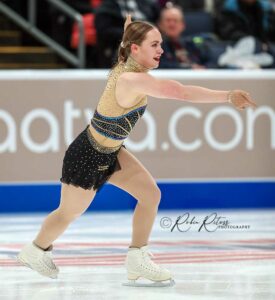 Now, thanks to a supportive camaraderie at the senior level, results at competitions are not the end all be all. For athletes, it’s much easier to be goal oriented than process oriented.
Now, thanks to a supportive camaraderie at the senior level, results at competitions are not the end all be all. For athletes, it’s much easier to be goal oriented than process oriented.
But that mindset subtracts from the countless hours Warne-Jacobsen has spent on and off the rink perfecting each intricate detail of her programs. It takes away the heartbreak of days when she didn’t land a single jump in a session. It takes away from the small and large wins she experiences each day.
“I have found that where I am now, it’s a lot a lot easier to enjoy the process,” she said. “I think the emphasis is less on the outcome, and more on just kind of celebrating all the work that you’ve done to get to this point.”
At the collegiate championships, Warne-Jacobsen will be debuting two new programs for the new season. Her short, “What Was I Made For?” by Billie Eilish stemmed from a show program. Her free program “Salome: Dance of the Seven Veils” takes a more grandeur and dramatic approach. Warne-Jacobsen has always wanted to skate to Salome, as her biggest inspiration in the sport Michelle Kwan, also skated to this piece of music years ago.
As for the upcoming season, Warne-Jacobsen hopes that success at the domestic level will ensure entrants into more international competitions. Nevertheless, she is focused on continuing to strengthen her technical and artistic skills while enjoying her time as a student.
“I want to continue to get better at balancing the two,” she said. “I definitely want to be engaged and really enjoy my classes this semester, and be a student as much as I can, while also working on being a committed athlete.”
Stay tuned to our next feature in our U.S. Figure Skating’s Collegiate/Intercollegiate Skating series. Read our first and second stories in the series.


